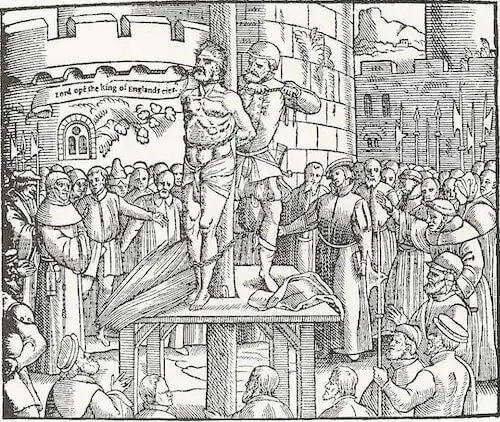To jump ‘out of the frying pan into the fire’ means ‘to escape from one evil only to succumb a greater one’.
Out of the frying pan into the fire
What's the meaning of the phrase 'Out of the frying pan into the fire'?
What's the origin of the phrase 'Out of the frying pan into the fire'?
‘Out of the frying pan into the fire’ is an old English proverb. However, it was brand new when it appeared in the Tudor courtier John Heywood’s influential collection of proverbs – A Dialogue conteinyng the nomber in effect of all the Prouerbes in the Englishe tongue.
It was a contemporary and colleague at the court of Henry VIII, Thomas More, who coined the expression in 1532.
More appears to be the first to have used the phrase, in his war of words with the English religious reformer William Tyndale – in the pamphlet The Confutacyon of Tyndales Answere, 1532:
Hath by his false caste of iuglynge, fetely conuayed hym self out of the fryenge panne, fayre into the fyre.
[He [Tyndale] has, by his false reproach of trickery, conveyed himself out of the frying pan into the fire.]
To understand what More was talking we need a little context. The frying pan was an allusion to the imagined device that demons would use to torture believers. An example of its use with that meaning is found in the translation of Jesus. The Floure of the Commaundementes of God, by the Tudor scholar Andrew Chertsey, 1521:
Here ben to deuylles the whiche bereth a fryenge panne for to haue me fryed wtin it by perdurabylyte.
[Here there were devils that brought a frying pan, in order to fry me for eternity.]
More was highly erudite and would certainly have been familiar with Chertsy’s works and the language used in the English Tudor religious community.
The ‘into the fire’ part is more straightforward. Those who fell out with Henry VIII were burned at the stake or, if he felt inclined to be merciful, beheaded. This is the fate that More experienced in June 1535.
Tyndale also incurred Henry’s anger by writing that Henry’s claim that his first marriage was unlawful. He was later arrested on a charge of heresy and was strangled and burned at the stake in 1536.
More’s statement about Tyndale did turn out to be correct. He did, by his own words, “convey himself into the fire”.
See also: out of sorts.
Related phrases and meanings
Browse more Phrases
About the Author

Phrases & Meanings
A-Z
A B C D E F G H I J K L M N O P Q R S T UV W XYZ
Categories
American Animals Australian Bible Body Colour Conflict Death Devil Dogs Emotions Euphemism Family Fashion Food French Horses ‘Jack’ Luck Money Military Music Names Nature Nautical Numbers Politics Religion Shakespeare Stupidity Entertainment Weather Women Work
How did we do?
Have you spotted something that needs updated on this page? We review all feedback we receive to ensure that we provide the most accurate and up to date information on phrases.
